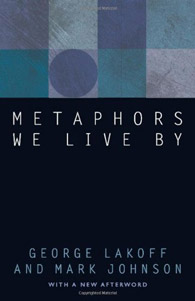Using this linguistic evidence, the authors expand on a range of metaphorical concepts. Examples include orientational metaphors using up and down, e.g. good is up, bad is down (chapter 4); ontological metaphors, which refer to events or concepts as entities or substances, e.g. his mind snapped, a beautiful catch, foot of the mountain (chapter 6); personification metaphors that give non-human entities human characteristics, e.g. this fact argues against that, life has cheated me, inflation is eating up our profits (chapter 7). Furthermore, the concept of metonymy—where one entity can stand for another—is extended to include examples such as: she’s just another pretty face, he bought a Ford, Bush bombed Bagdad (chapter 8). Each of these ideas about metaphors and metaphorical concepts offers an explanation of how people understand the world and use this understanding to shape more abstract or unfamiliar concepts into language.
Lakoff and Johnson also look at the general nature of metaphors and metaphorical concepts. One fundamental idea is the grounding of metaphors in experience. In the authors words: »… we feel that no metaphor can ever be comprehended or even adequately represented independently of its experiential basis.« (p. 19). This idea is illustrated by diagrams (p. 20) showing how an experiential basis provides the critical link between the concept of up and down and more and less. Lakoff and Johnson offer the word »is« as short hand in connecting metaphorical concepts such as »more is up«. To further explain how metaphors work, the authors offer a number of characteristics or features that metaphors exhibit. For instance, metaphoric concepts are systematic or coherent in character. To illustrate: given that time is money, it follows that time is valuable just as money is valuable, which can be seen in the expressions: stop wasting my time, you need to budget your time. (chapter 2) Metaphors can also hide and highlight. For example, if an argument is viewed through the metaphor: argument is war, the violent aspects are highlighted, as in attacking a position, winning. On the other hand, the idea that someone is giving you the time and is in search of mutual understanding is hidden by this metaphor (p. 18). Metaphors are embedded in context (chapter 3). One example of this is: »We need new alternative sources of energy. This means something very different to the president of Mobil Oil from what it means to the president of Friends of the Earth.« (p. 12). Lakoff and Johnson repeatedly underscore the partial or incomplete nature of metaphors; because they highlight certain aspects of a concept for the sake of comparison, they inevitably leave out other aspects.
Metaphors are also embedded in the value system of a culture, or as the authors say, are culturally coherent. An example of the reflection of these value systems or value priorities in metaphors is: »For instance, more is up seems always to have the highest priority since it has the clearest physical basis. The priority of more is up over good is up can be seen in examples like ›inflation is rising‹ and ›the crime rate is going up.‹ Assuming that inflation and the crime rate are bad, these sentences mean what they do because more is up always has top priority« (p. 23). This cultural coherence also means that metaphorical concepts are anchored in experience and cultural preferences (an example from chapter 5: »although orientational metaphors appear to be universally human, the orientation—for example active is up and passive is down in western European culture—can vary from culture to culture depending on which aspect is valued more .…«) This cultural influence can be seen in rap-lyrics and street slang (who’s bad?, that’s bad) where bad means good or savvy.
Ausgabe Nr. 2, Frühjahr 2013

